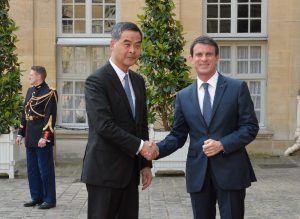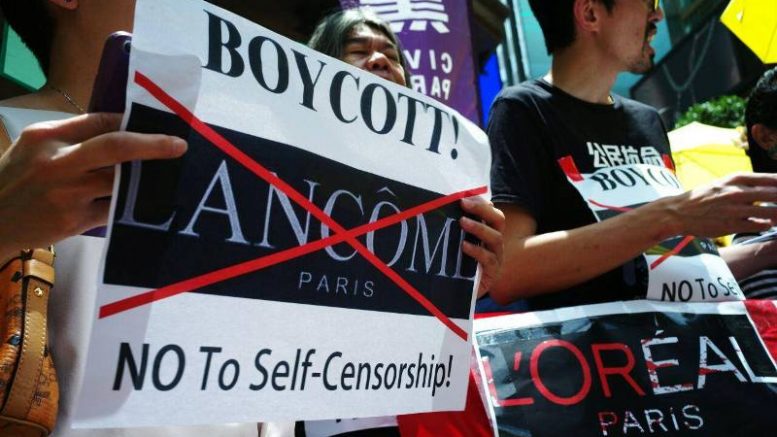By Chris Yeung –
On Thursday, Chief Executive Leung Chun-ying was a busy man in Paris eagerly keen to convince his host, French Prime Minister Manuel Valls, Hong Kong is best positioned under the “one country, two systems” political framework to benefit from a rising China.
He trumpeted his notion of Hong Kong being the “super-connector” between the 1.3 billion-populated nation and the world.
But at home, a drama surrounding a French cosmetic brand Lancome has laid bare the ugly side of the face of “one country, two systems.” On Thursday, Lancome reopened its stores across Hong Kong, one day after protests were held over the company’s cancellation of a concert by Canto-pop star Denise Ho Wan-sze. It came after Ho faced blistering attack by the Global Times, a sister publication of the mainland official People’s Daily, for allegedly supporting Hong Kong independence.
An online petition calling on L’Oreal, the parent company of Lancome, to reconsider the cancellation launched by French citizen and former philosophy teacher Beatrice Desgranges ran viral on social media. Desgranges wrote: “We cannot accept that Lancome, in their way the ambassador of France – country of human rights – in Hong Kong, sacrifices the freedom of thought and expression to their commercial policy”.
The controversy hit headlines of French newspapers including Le Monde. A Le Monde reader named “CB” commenting: “A market of 1.3 billion people versus a market of 7.5 million inhabitants … For now the fight is not balanced.”

Chief Executive Leung Chun-ying tells French Prime Minister Manual Valles Hong Kong is best positioned to get the best of both words under ‘one country, two systems.’
If the ordeal of Ho has whipped up a storm in the city, it is because it has struck the sensitive nerve of Hong Kong citizens and some quarters of the international community about the emergence of Chinese hegemony under its ruling Communist Party.
Faced with a 1.3 billion-populated market, such international brands as Lancome and conglomerates are confronted with a no-win situation. Take the case of Denise Ho. If they decided to go ahead with Ho’s concert, they face the risk of a boycott of their products by mainlanders. But if they decided to cancel the concert as they did, they faced another boycott and angry protests by people in Hong Kong and other parts of the world, like France as happened.
Under such circumstances, it is not possible for the French company to be able to survive the political storm unharmed. No cosmetics can help cover the wounds of Lancome inflicted by the controversy.
Taking the advantage of hindsight wisdom, pundits have criticised Lancome for not having done a good job in trying to avert a public relations disaster. Realistically, there is practically little they can do when faced with mainland authorities who refuse to abide by the rules and practices generally accepted in the international community.
Business is business
The rule is simple and clear: business is business. Businesses, government and society at large are all losers if business decisions are being tinkered with by political authorities.
Even before China adopted open and reform policy in 1979, Hong Kong has played a unique role in connecting the mainland with the world and, importantly, contributing a big part in the country’s phenomenal economic growth.
That Hong Kong is able to play that role is because the city is different from the mainland; it has well-established rules and systems that are not subjected to the likes or dislikes or the political agenda of the power-that-be. This is also the best guarantee China could make to allay fears that the policy of “one country, two systems” policy exists in name, but not in reality.
Coming amid growing tension and friction in mainland-Hong Kong relations, the Denise Ho controversy has swiftly elevated to the high political plane of “one country, two systems.” It added more fuel to the fire.
Writing on her Facebook, Ho said: “The fact is fears has already blanketed everything. For those who still think it (her case) has nothing to do with them and therefore they just have to mind their own business, my advice is: don’t be too naive.
“Now that you can still speak out, you must do whatever you can to defend yourself, defend your bottom-line. You must help yourself. Now.”
Chris Yeung is founder and editor of the Voice of Hong Kong website. He is a veteran journalist formerly worked with the South China Morning Post and the Hong Kong Economic Journal. He writes on Greater China issues.
Photo: Pictures taken from League of Social Democrats Facebook and Hong Kong Government website


Be the first to comment on "Lancome row exposes ugly side of ‘one country, two systems’"